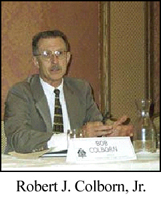Background
Administrative rules affect all citizens. They are the tools through which the executive branch of government implements or interprets legal mandates.
Administrative Codes and Registers (ACR), a section of the National Association of Secretaries of State (NASS), created the Robert J. Colborn, Jr. Innovation Award in July 2001 in honor of Robert J. Colborn, Jr.
Mr. Colborn was the administrator of the Maryland Division of State Documents from July 1, 1974 through March 31, 2001.
In that role, Mr. Colborn led the staff of the Division to make substantial contributions to the publication and accessibility of administrative rules.
He shared ideas developed in Maryland with his colleagues across the country.
In 1978, Mr. Colborn founded ACR. His influence is seen in rulemaking publications and processes nationwide.
Purpose
The Robert J. Colborn, Jr. Innovation Award continues in the spirit of Mr. Colborn’s efforts for jurisdictions (state, federal, territorial, or protectorate governments) to share ideas with other jurisdictions to improve administrative rulemaking.
The Colborn Award annually recognizes a program that demonstrates creativity and innovation in providing public access to, or managing, administrative rules. This includes substantial contributions to the flow of information to the public.
This effort will help improve efficiency and delivery of exceptional services to citizens, businesses, and other governmental entities. The winner of the Colborn Award will be invited to present the program at the summer conference.
Eligibility
The Colborn Award recognizes a government entity responsible for implementing a program that demonstrates creativity and innovation in providing public access to, or managing, administrative rules. A nomination may recognize other groups, vendors, and individuals involved in the development, or implementation of the program, but the award is made to the entity responsible for the program.
The government entity being nominated must have an active member of ACR on its staff.
The nominations process is open–anyone may nominate a program for the award.
- A program that is nominated, but that does not receive the award, may be renominated in a subsequent year.
- A jurisdiction with a member serving on the ACR Awards Committee is ineligible to receive the award during that member’s term of service on the awards committee.
- A program that has been in place for several years may be nominated–there is no connection between program implementation date and a nomination.
Consideration Criteria and Nomination Procedures
The ACR Awards Committee, consisting of three ACR members appointed by the President, considers nominations and selects the winner by unanimous consent. Nominations will be evaluated on the clarity, quality, and completeness of information presented. All nominations must be submitted in electronic form and should include the following elements:
- a completed nomination form;
- a one-page executive summary suitable for posting on the Internet; and
- a written justification containing information on the nomination including the areas listed below (4 a through c), in the same order and in as much detail as appropriate, but not exceeding five pages (12 point font). The executive summary does not have to be counted as one of the five pages.
The following format must be followed:
a. a description of the project, including the length of time in operation; b. the significance to the improvement of the operation of government; and c. the benefits realized by citizens, the state, or others associated with the rulemaking process.
Examples of Programs
The following list are just some examples of programs eligible for consideration:
- Use of technology to improve public participation in the rulemaking process.
- Use of technology to improve public access to rulemaking documents.
- Publication of a first edition of an administrative code or register.
- Public outreach to educate citizens regarding the rulemaking process.

